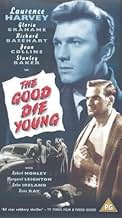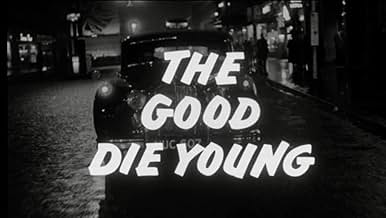En Londres, tres hombres buenos respetuosos de la ley y su líder sin escrúpulos están a punto de cometer un delito grave, pero por diferentes razones.En Londres, tres hombres buenos respetuosos de la ley y su líder sin escrúpulos están a punto de cometer un delito grave, pero por diferentes razones.En Londres, tres hombres buenos respetuosos de la ley y su líder sin escrúpulos están a punto de cometer un delito grave, pero por diferentes razones.
- Dirección
- Guionistas
- Elenco
- Dirección
- Guionistas
- Todo el elenco y el equipo
- Producción, taquilla y más en IMDbPro
Opiniones destacadas
For a while back in the fifties, British cinema seemed to have enough grit and clout to it to almost be able to compete with the American market in regards crime thrillers (if not quite noirs); The Good Die Young is one of those that has a good try and is a pretty enjoyable piece even if it lacks the grit and tension of similar American products. The film opens with an intriguing set up but then jumps back to establish the story and characters and it is here where it becomes weak. The back stories are rather melodramatic and it doesn't fit well with what was meant to be a bit tougher and gripping; they are interesting enough to do the job but I must admit to feeling that they were a bit dragged out and unnecessarily long. However, if you make it through this main body of the film you'll get to an ending that is just what the film should have been throughout. I won't spoil it but it is enjoyably brutal, downbeat and gripping "about time" was my thought when I realised that the film had gotten going.
The cast do their best with the melodrama but the material isn't there for them and they are mixed. Harvey and Baker stand out with strong performances; Basehart is good but Ireland feels like he is just making up the numbers. Naturally Collins stands out today, and she is quite good but the melodrama is made better by Grahame, Ray and, to a lesser extent, Leighton. Of course the men are all much better in the proper crime side of the film and this is partly due to better and more atmospheric direction from writer/director Gilbert, who also injects the pace when it is required.
Overall this is an average film mainly because the back story takes up far too much of the film, is too melodramatic and doesn't sit well with the tough tension promised in the first scene and delivered at the end. With the main trunk being rather plodding, the ending does feel a lot better mainly because you're grateful that the film has gotten going. Could have been great but is merely reasonably good; worth seeing for genre and period fans but will not impress a wider audience.
Four unhappy plot lines converge into one very unhappy ending: Prizefighter Stanley Baker boxes with a broken hand that ends up gangrenous and amputated. Since his wife (Rene Ray) has given their meager life savings to her wastrel brother, he doesn't know where his next farthing is coming from.
Richard Basehart quits his job in New York to return to London and fetch his English wife (Joan Collins), who is being held hostage by her manipulative, malingering old monster of a mother (Freda Jackson).
G.I. John Ireland, on 48-hour furlough, goes AWOL when he can't find a minute to spend with his self-absorbed starlet wife Gloria Grahame, making time with the hot young star on her picture (Lee Patterson).
Lawrence Harvey, a sadistic sweet-talker, gambles and carouses on the money of his rich wife (Margaret Leighton), who's fast getting fed up with his feckless ways; he dines out on being a decorated war hero, but the father who disowns him (Robert Morley) believes he exterminated a nest of Germans who were unarmed and unconscious.
During a chance meeting in a pub, Harvey, desperate to make good on a bad check he wrote, wheedles the at-first-reluctant others into a scheme for robbing a postal truck of recycled Bank of England currency. He claims to be doing it only to help them out of their jams, but his sole interest lies in helping himself....
Lewis Gilbert (later to direct Alfie and three installments of the 007 franchise) opens just as the robbery is about to take place. Then he quickly flashes back to tell how the four perpetrators got there. He intercuts their stories (rather deftly), returning to the scene of the crime and its grisly aftermath only at the end. So the strength of the movie lies in its individual vignettes and the actors who bring them to life. These are variable.
Top-billed Harvey overplays his hand as the scheming psycho, as does Grahame as the round-heeled twitch. Ireland and Basehart cope well with loosely textured roles. The breakthrough performance is Baker's, who brings to mind all those deluded pugilists in American ropes-and-canvas epics, dying for illusory glory. The wives are mostly afterthoughts, though Ray and Leighton bring some poignancy to their plights. Morley and Jackson deserve mention for the incisiveness of their peripheral roles. More a drama of converging fates than a film noir (even a Britnoir), The Good Die Young holds attention owing to its large and seasoned cast and its slow but determined pace.
The film is ultimately about the allure of crime than anything else; those expecting a gangster film will be rather sorely disappointed, with Gilbert's film coming to resemble more a class drama than a crime genre piece. It's bookended by the men clustered together with tensions running high and a sorely undesired predicament looming, a clerk named Joe Halsey (Basehart) narrating to us how it was he and three others got to be occupying a rich playboy's car sizing up an object and wielding pistols; the finale a quite gripping trawl through the murky, cobbled streets of 1950s Britain as police officers; stray freight trains and unfaithful partners in crime each pose their own threats. It's here Gilbert proves he's just as apt at dealing with dramatic action set-pieces as he is engaging us with character: specifically, who's involved; what's at stake; who's going where, and why; the internal 'checkpoints' the characters must reach as well as the sorts of action that must be undertaken, the man having his characters in The Good Die Young pay special attention to both the methodical planning and dealing with each obstacle within an action set piece which needs separately dealing with during the final getaway.
Gilbert executed similarly effective craft later on in his career, namely when he was granted the helming of three separate films within the James Bond cannon. 1977's The Spy Who Loved Me saw an extended scene on board a tanker ship nearer said film's climax and required its lead to first get aboard; find some trapped hostages; recover them only to discover a wall of seemingly impregnable steel; find something which might destroy that; obtain it, and then follow through once again with the next course of action. The attention to such things were initially used to a lesser degree of success in 1967's You Only Live Twice. But in The Good Die Young, a similarly effective craft is evident behind not only the finale but the getting to this point; the film coming to resemble one long flashback told to us by the aforementioned Joe involving a whole group of people brought together through problems with money.
The film does its best to intrinsically link each man, each one being of a respective background in class and career; one of whom is a boxer named Mike Morgan (Baker), a man at the end of his stretch as a fighter - the ring-set howls and wails as another fatal blow is landed upon a poor opponent much to the glee of the crowd echoing down below into the locked room as Mike sits there knowing one of his hands is on the brink of being seriously damaged as it is. Meanwhile, American pilot Eddie Blain (Ireland) refuses orders to ship out to West Germany with the American air force to instead zero in on his wife and her infidelities; whereas narrator Joe maintains a rocky relationship with the mother of his own wife, something he gets involved in so much so that flying back to England from his American-based clerical job to get involved sees him fired.
So each man is rather attuned to their wives, Mike's relationship seeing him admit to lending his hard-earned cash to his own wife's brother if she'd told him to; his ultimate goal to take his large earnings and escape to his beloved. Furthermore, each man's respective situation in each of their jobs sees them hit a proverbial wall bringing about unemployment or redundancy; each of the three men additionally appearing to have served in a respective war and two of them have experiences with near-death or great harm of some kind in that Joe's mother in law attempts suicide and Mike must come to have some serious work done on his hand.
The men are eventually thrust together by the seemingly indomitable Miles Ravenscourt (Harvey), a young man, whom might be richer than he actually is, but whom occupies a plush and far richer locale; a self indulgent man whose home is rife with portraits of himself and whose wife Eve (Leighton) must suffer his begging for more money despite both parties' knowledge of his trouble with gambling debts; a man so estranged from his father, that he hopes to outlive him so that Miles may never see any of his inheritance, such is is ill-minded way with money as the film will go on to document. As previously mentioned, the film is more about the allure of crime or the idea behind a criminal act that'll greatly benefit oneself arriving with a sense of enticement, than most others things. The duality in each of the four men may appear looser than desired, but Gilbert crafts rather-a taut and tight heist film about desperate people doing desperate things at desperate times.
¿Sabías que…?
- Trivia(at around 31 mins) The prominent painting in the apartment of Eve (Margaret Leighton) of Rave (Laurence Harvey) as a polo player was clearly altered from a copy of one of an American "old money" socialite and sportsman, Winston Guest, a top polo player in his day.
- ErroresDuring the robbery, Miles Ravenscourt fires 9 shots from a 6-shot revolver without reloading.
- Citas
Miles Ravenscourt: Someone who is quite determined to be most unpleasant about it has a cheque of mine for a thousand which is probably bouncing at this very moment. So if you are determined not to share the money, in a few days from now, you'll be sharing some very lurid headlines.
Sir Francis Ravenscourt: You can't threaten me any more. Public disgrace couldn't be worse than sitting here being reminded that I'm your father.
Miles Ravenscourt: You really do hate me, don't you?
Sir Francis Ravenscourt: I don't hate you. I Ioathe and despise the very sight of you.
- ConexionesFeatured in Frances Farmer Presents: The Good Die Young (1958)
Selecciones populares
- How long is The Good Die Young?Con tecnología de Alexa
Detalles
- Fecha de lanzamiento
- País de origen
- Idioma
- También se conoce como
- The Good Die Young
- Locaciones de filmación
- Barbican Estate, City of London, Inglaterra, Reino Unido(Barbican train platform used for the fictional High Street Station)
- Productoras
- Ver más créditos de la compañía en IMDbPro
- Tiempo de ejecución1 hora 40 minutos
- Color



































